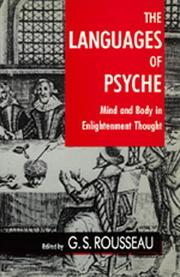| Listing 1 - 2 of 2 |
Sort by
|

ISBN: 0520070445 0520071190 0520910435 0585033935 9780520910430 9780585033938 9780520070448 9780520071193 Year: 1990 Publisher: Berkeley, California : University of California Press,
Abstract | Keywords | Export | Availability | Bookmark
 Loading...
Loading...Choose an application
- Reference Manager
- EndNote
- RefWorks (Direct export to RefWorks)
The Languages of Psyche traces the dualism of mind and body during the "long eighteenth century," from the Restoration in England to the aftermath of the French Revolution. Ten outstanding scholars investigate the complex mind-body relationship in a variety of Enlightenment contexts—science, medicine, philosophy, literature, and everyday society. No other recent book provides such an in-depth, suggestive resource for philosophers, literary critics, intellectual and social historians, and all who are interested in Enlightenment studies.
History of philosophy --- anno 1700-1799 --- Mind and body --- Enlightenment --- Social Sciences --- Psychology --- History --- Aufklärung --- Eighteenth century --- Philosophy, Modern --- Rationalism --- Enlightenment. --- NON-CLASSIFIABLE. --- History. --- 17th century philosophy. --- 18th century culture. --- 18th century philosophy. --- alexander crichton. --- anti semitism. --- dualism. --- enlightenment studies. --- evolution of thought. --- fiction. --- french revolution. --- hume. --- literature. --- locke. --- long 18th century. --- marquis de sade. --- medical psychology. --- medicine. --- mental anatomy. --- mind and body. --- modern moral theory. --- natural history. --- philippe pinel. --- physiology. --- political science. --- racism. --- restoration of england. --- revolutionary doctors. --- science. --- social history. --- social perspective. --- thomas willis.
Book
ISBN: 052095887X 9780520958876 1306859700 9781306859707 0520274075 9780520274075 Year: 2014 Publisher: Berkeley, CA : University of California Press,
Abstract | Keywords | Export | Availability | Bookmark
 Loading...
Loading...Choose an application
- Reference Manager
- EndNote
- RefWorks (Direct export to RefWorks)
Wye Jamison Allanbrook's The Secular Commedia is a stimulating and original rethinking of the music of the late eighteenth century. Hearing the symphonies and concertos of Haydn and Mozart with an ear tuned to operatic style, as their earliest listeners did, Allanbrook shows that this familiar music is built on a set of mimetic associations drawn from conventional modes of depicting character and emotion in opera buffa. Allanbrook mines a rich trove of writings by eighteenth-century philosophers and music theorists to show that vocal music was considered aesthetically superior to instrumental music and that listeners easily perceived the theatrical tropes that underpinned the style. Tracing Enlightenment notions of character and expression back to Greek and Latin writings about comedy and drama, she strips away preoccupations with symphonic form and teleology to reveal anew the kaleidoscopic variety and gestural vitality of the musical surface. In prose as graceful and nimble as the music she discusses, Allanbrook elucidates the idiom of this period for contemporary readers. With notes, musical examples, and a foreword by editors Mary Ann Smart and Richard Taruskin.
Music --- Opera --- Comic, The, in music. --- Mimesis in music. --- Art music --- Art music, Western --- Classical music --- Musical compositions --- Musical works --- Serious music --- Western art music --- Western music (Western countries) --- History and criticism. --- Philosophy and aesthetics. --- 18th century culture. --- austrian composer. --- chamber music. --- classical music. --- classical period. --- concertos. --- cultural studies. --- ernest bloch lectures. --- franz joseph haydn. --- greatest classical composers of all time. --- haydn. --- historical. --- history of music. --- instrumental music. --- late 18th century music. --- mimetic association. --- mozart. --- music studies. --- music. --- musical influences. --- musical theorists. --- opera buffa. --- opera. --- operatic style. --- symphonies. --- theatre. --- vocal music. --- wolfgang amadeus mozart.
| Listing 1 - 2 of 2 |
Sort by
|

 Search
Search Feedback
Feedback About UniCat
About UniCat  Help
Help News
News